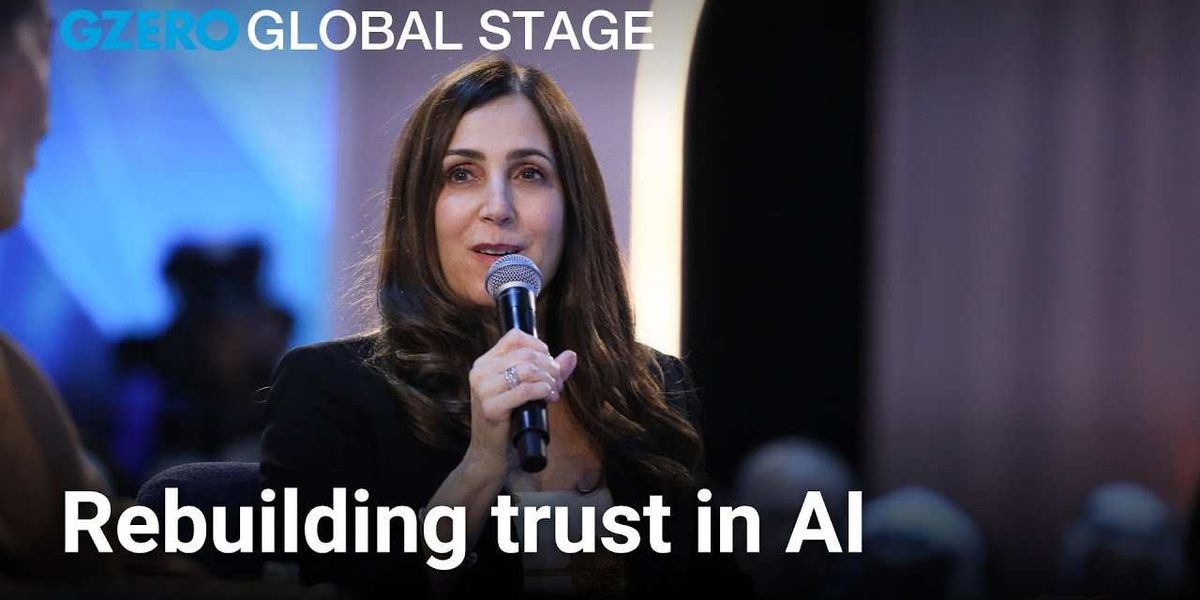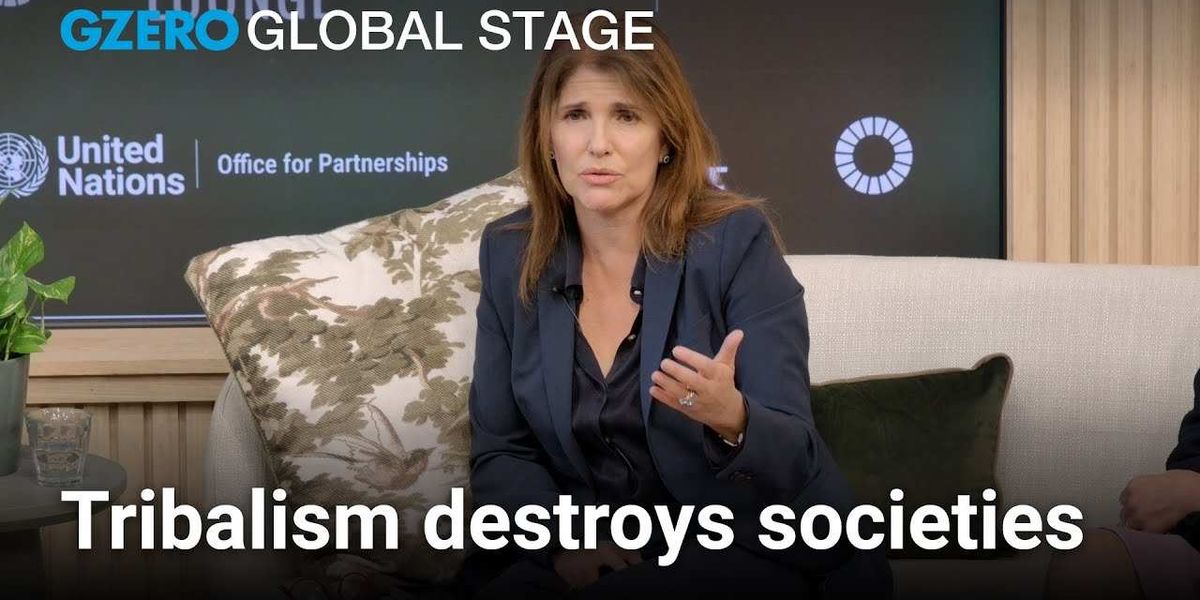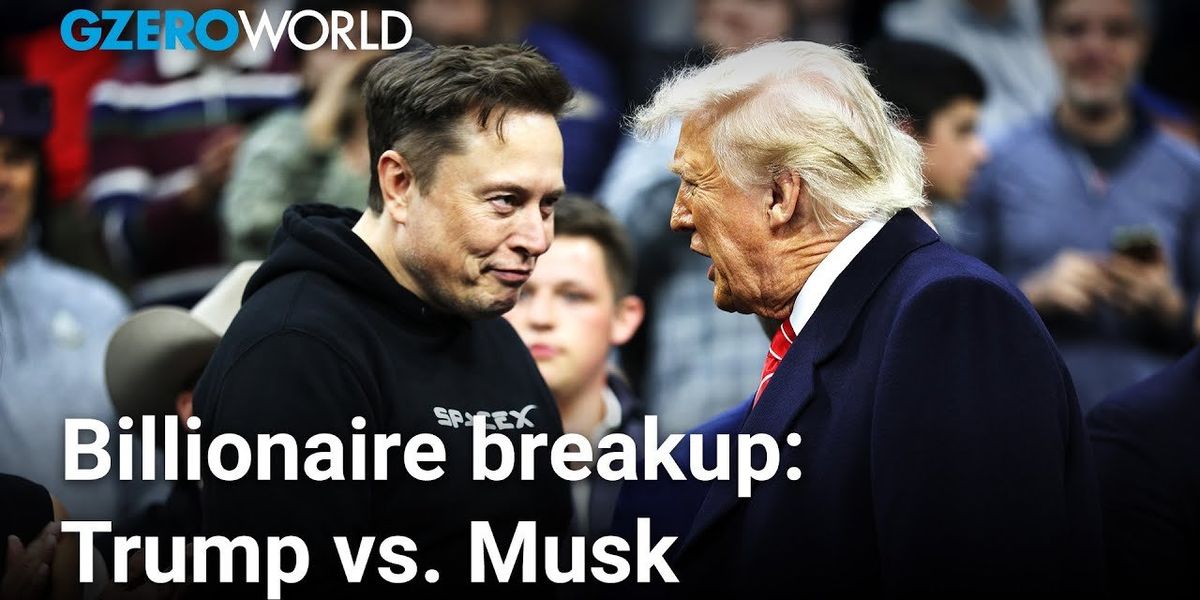Trending Now
We have updated our Privacy Policy and Terms of Use for Eurasia Group and its affiliates, including GZERO Media, to clarify the types of data we collect, how we collect it, how we use data and with whom we share data. By using our website you consent to our Terms and Conditions and Privacy Policy, including the transfer of your personal data to the United States from your country of residence, and our use of cookies described in our Cookie Policy.
{{ subpage.title }}
Responsible AI for a digital world
How do we ensure AI is trustworthy in an era of rapid technological change?
Baroness Joanna Shields, Executive Chair of the Responsible AI Future Foundation, says it starts with principles of responsible AI and a commitment to ethical development.
Shields explains that her foundation’s work “is about empowering everyone equally and enabling others to level up and be part of this revolution,” highlighting its focus on guiding the ethical development and use of AI.
She emphasizes the critical importance of information integrity, warning that AI systems trained on social media data risk amplifying conspiracy theories and divisive content. Reflecting on her experience at Meta, Shields notes, “Models that are trained with social media data… will further embed and create communities where people are… exposed to damaging content,” underscoring the need for transparency and awareness in AI-generated information.
Shields shared these insights at the 2025 Abu Dhabi Global AI Summit panel “Bringing AI Technology, Trust, and Talent to the World,” part of GZERO Media’s Global Stage series in partnership with Microsoft, which brings together global leaders to discuss the geopolitical and technological trends shaping our world.
Putting institutions above individuals: Ending impunity to save trust in democracy
Ambassador Paula Narváez Ojeda warns that when powerful actors break norms without consequences, young people lose faith, further pushing societies toward tribalism and away from respectful debate, amplified by toxic social media dynamics. The fix: put institutions above individuals and make accountability real.
“How can we talk about democracy’s importance if people witness every day that nothing happens to those who don’t respect it?”
Excerpt from a Global Stage livestream at UN HQ on the International Day of Democracy.
Watch more of GZERO Media’s Global Stage series, sponsored by Microsoft, from the 80th Session of the United Nations General Assembly here: gzeromedia.com/globalstage
American President Donald Trump's X Page is seen displayed on a smartphone with a Tiktok logo in the background
Where we get our news - and why it changes everything
In August 1991, a handful of high-ranking Soviet officials launched a military coup to halt what they believed (correctly) was the steady disintegration of the Soviet Union. Their first step was to seize control of the flow of information across the USSR by ordering state television to begin broadcasting a Bolshoi Theatre production of Swan Lake on a continuous loop until further notice. (Click that link for some prehistoric GZERO coverage of that event.)
Even in the decade that followed the Cold War’s end, citizens of both authoritarian states and democracies had far fewer sources of reliable information than today about what was happening in their communities, across their countries and around the world.
Earlier this month, the Reuters Institute published its 14th annual Digital News Report, which Reuters claims is the “most comprehensive study of news consumption worldwide.” Its findings detail just how fundamentally different today’s media landscape has become. Here are some key takeaways that help us understand how and where people get their information and ideas about what’s happening today:
- “News use across online platforms continues to fragment.”
- “Engagement with traditional media sources such as TV, print, and news websites continues to fall, while dependence on social media, video platforms, and online aggregators grows. This is particularly the case in the United States.”
- “The proportion accessing news via social media and video networks in the United States (54%) is sharply up – overtaking both TV news (50%) and news websites/apps (48%) for the first time.”
- “Around a third of our global sample use Facebook (36%) and YouTube (30%) for news each week. Instagram (19%) and WhatsApp (19%) are used by around a fifth, while TikTok (16%) remains ahead of X at 12%.”
- Personalities and influencers are, in some countries, playing a significant role in shaping public debates.
- There’s no reason to expect these trends won’t continue indefinitely.
There’s much more in the Reuters report, but today let’s focus on a few political implications of the points above.
In the years since social media and online influencers began shaping our perception of reality, we’ve seen strong anti-establishment political trends. Think Brexit, the election of charismatic political outsiders (like Donald Trump), and a move away from long-entrenched political establishments in dozens of countries.
Social media algorithms create “filter bubbles” as algorithms feed us steady supplies of what they’ve learned we like at the expense of new information and ideas that make us question what we believe. That trend helps explain the worsening polarization we see in the United States and many European countries.
That problem is compounded by the increasing prevalence in social media feeds of AI bots, which can generate heavy volumes of false information, distorting our sense of reality every day and in real time.
All these trends will make politics, particularly in democracies, much less predictable over time as elections swing outcomes between competing ideologies.
As a source of news and insight, social media has brought billions of people directly into the political lives of their countries in ways unimaginable a generation ago. They’ll continue to play a positive role in helping news consumers and voters learn more and share their views. But the unreliability of so many social media information sources — and the political volatility it increasingly generates — create problems that will only become more complex as technologies change.
And this problem is intensifying at a time when more of the big threats facing governments extend across borders — the eruption of more regional wars, climate change fallout, management of refugee flows, and governance of artificial intelligence. Big ideological swings following elections will make long-term multinational cooperation much more complicated.
Tell us what you think. How should our elected leaders, media sources, and all of us news consumers respond to these challenges? Let us know here.
Alberta sovereigntists and supporters gather outside the Alberta Legislature on May 3, 2025.
What We’re Watching: Separatists go bust, Canada goes social, US readies tax retaliation
Alberta separatists underwhelm in local election
Alberta’s separatist movement came up short in a bellwether by-election in rural Calgary on Monday, winning a disappointing 19% of the vote in Olds-Didsbury-Three Hills. Cameron Davies, leader of the separatist Alberta Republican Party, came in third, behind the governing United Conservative Party and the left-leaning New Democratic Party. Although a referendum on separatism is still in the cards, the weak showing in what was thought to be prime separatist territory suggests the movement may have little steam after all.
Canada to get its own private social network
A handful of nationalistic Canadian tech leaders provoked by Donald Trump’s threats are launching a Canadian social media platform operated independently of the American cloud. Known as Gander, it will run on Canadian servers, in line with Canadian privacy and moderation rules — meaning tighter policing of posts considered hate speech. In a unique feature, users will have the option of posting on a globally visible network or a Canada-only one. Can an upstart like this really challenge US and Chinese social media giants? We’re keen to have a … Gander.
Republicans could strip tax retaliation clause from “Big Beautiful Bill”
The Trump administration’s massive budget bill currently gives the White House the power to retaliate against other countries that impose taxes the US considers unfair. Key targets are minimum corporate tax rates and digital services taxes (like Canada’s). Top Republican officials say they will remove the clause if the EU and other countries drop or renegotiate the offending taxes. But that would need to happen by this weekend, since Donald Trump wants to sign the bill into law ahead of next week’s July Fourth holiday.
What’s behind Trump & Musk’s public feud?
Elon Musk and President Donald’s Trump’s White House bromance imploded in spectacular fashion last week in a feud that played out in full view of the public, with the two billionaires trading insults in real-time on social media. That fight appears to be cooling down, at least for now, but President Trump has made it clear he has no intention of mending the relationship any time soon. On a special edition of GZERO World, Semafor Co-Founder and Editor-in-Chief Ben Smith joins Ian Bremmer to discuss what led to the breakup and where the Trump administration’s relationship with Silicon Valley goes from here.
There’s a lot at stake: for Trump, Musk’s political funding ahead of the 2026 midterms; for Musk, billions in government contracts and subsidies for his companies. Smith and Bremmer discuss Trump and Musk’s alliance of convenience, where it all broke down, the role of political journalism in covering such a public conflict, and who ultimately has the upper hand in the battle between political leaders and tech oligarchs.
“[President] Trump's power to reward his friends and punish his enemies in the very short term, in very consequential and permanent ways is totally unprecedented,” Smith says, “Business leaders, civil society and the media can be intimidated and Trump knows it. He usually wins that game of chicken.”
GZERO World with Ian Bremmer, the award-winning weekly global affairs series, airs nationwide on US public television stations (check local listings).
New digital episodes of GZERO World are released every Monday on YouTube. Don't miss an episode: subscribe to GZERO's YouTube channel and turn on notifications (🔔).
Mexican social media influencer, Valeria Marquez, 23, who was brazenly shot to death during a TikTok livestream in the beauty salon where she worked in the city of Zapopan, looks on in this picture obtained from social media.
“Hey Vale” – a live-streamed killing and the scourge of femicide in Latin America
Last Wednesday afternoon, Valeria Márquez, a 23-year-old Mexican cosmetics and lifestyle influencer with more than 200,000 followers on social media, set up a camera and began livestreaming on TikTok from her beauty salon near Guadalajara, Mexico.
Moments later, as she spoke to her followers while holding a stuffed animal, a man entered the salon.
“Hey Vale?” He asks out of frame, using a casual nickname for Márquez as he apparently offers her a gift. He then shoots her to death, picks up the camera, and switches it off.
Several days later, Maria José Estupiñán, a Colombian model and social media star, was also gunned down in the doorway of her home in the border town of Cúcuta by an apparent stalker.
The killings of the two women, both relatively affluent, young, and with large public profiles, have shaken the two countries, throwing fresh attention on the wider problem in Latin America of femicide – the killing of women or girls because of their gender.
Mexican President Claudia Sheinbaum has assigned her top security team to investigate the killing of Márquez, which authorities have already classified as a femicide.
According to a study published late last year, roughly 11 women were murdered every day in femicides in the region in 2023. The most dangerous countries were Honduras, where 7.2 out of every 100,000 women died in femicides, and the Dominican Republic, where the rate was nearly 3. In Colombia, local watchdogs recorded nearly 900 femicides last year, a seven-year high.
As elsewhere in the world, the vast majority of these crimes are committed by men who are known to the victims – current, former, or aspiring romantic partners, as well as male family members.
But addressing the problem, experts say, is a complicated mix of changing laws and shaping minds.
Over the past three decades, countries throughout the region have passed at least some legislation to address violence against women, pushed both by United Nations conventions on violence against women, and activist movements like Ni Una Menos (“Not one woman less”), founded in Argentina a decade ago in response to the murder of a pregnant, 14-year-old girl at the hands of her boyfriend.
Some countries have gone further, developing specific frameworks for the documentation and prosecution of femicide. Mexico and Colombia, in fact, have some of the strictest laws on the books, says Beatriz García Nice, a gender-based violence expert based in Ecuador. But laws aren’t enough.
“It’s not that we lack laws,” she says, “it’s that there is impunity and the lack of enforcement.”
One part of that comes from deeply ingrained social norms, she says.
“We have to change cultural traits so that you’re not teaching kids, especially boys, that women are property, or that their only role in society is to belong to a man.”
Corruption also plays a role in a region where graft and nepotism are rampant in judiciary systems. In Mexico, for example, a study from 2023 showed nearly half of people lack confidence in the judiciary, and close to 90% of people said they didn’t report crimes for that reason.
This fuels reluctance to report gender-based crimes as well – more than 85% of women in Mexico, Honduras, and Ecuador say they don’t report episodes of physical or psychological violence. That matters because femicide, García Nice points out, is only the gruesome end of a long road that begins with other kinds of abuse.
The rise of the influencer economy can make things even worse, especially as legal frameworks addressing online harassment of women are still relatively weak in Latin America.
“Online violence bleeds into offline violence,” says Rangita de Silva de Alwis, a University of Pennsylvania law school professor who is on the UN committee that focuses on eradicating violence against women.
“The impunity that we see in the online world has real world consequences.”
SnapChat app displayed on a smart phone with in the background SnapChat My AI, seen in this photo illustration, on August 20, 2023, in Brussels, Belgium.
The FTC’s concern about Snapchat’s My AI chatbot
On Thursday, the US Federal Trade Commission referred a complaint to the Justice Department concerning Snapchat’s artificial intelligence chatbot, My AI. The FTC doesn’t usually disclose these referrals but felt it was in the public interest to do so, citing potential “risks and harms” to young users of the social media app.
My AI is a chatbot built on OpenAI and Google’s large language models and accessible as part of the Snapchat app. It’s been criticized for being “wildly inappropriate” for the largely teenage audience on Snapchat. The UK had also launched a privacy investigation over teen privacy concerns but closed it in May, issuing a warning to the entire tech industry to put privacy first before rolling out AI tools.
That said, the FTC has yet to disclose what the actual complaint against My AI is about. In response, Snapchat’s parent company told reporters that the complaint is “based on inaccuracies and lacks concrete evidence.” It also said there are “serious First Amendment concerns” and criticized the timing of the announcement — “on the last day of this administration.” It’s unclear whether Trump’s Justice Department leadership will take up a case against Snapchat based on this referral, but it adds a potential Big Tech AI case to Trump’s docket from day one.
TikTok CEO Shou Zi Chew testifies before the House Energy and Commerce Committee on Thursday, March 23, 2023 in Washington D.C.
Looks like the TikTok ban is coming. Probably. And with unintended consequences
Barring an eleventh-hour reprieve, TikTok’s operations in the US are likely to be shut down on Sunday. China is said to be considering a sale of its stateside outfit to X owner Elon Musk as the incoming administration seeks a pause on the ban so it can pursue a deal to keep it running. While both of those options look unlikely, at least in the short term, President-elect Donald Trump is considering an executive order that would delay enforcement of the ban for 60 to 90 days.
The Supreme Court hasn’t ruled on a challenge to the ban yet, nor is it required to by the Sunday deadline. The law, passed in April, only requires that US app stores no longer carry or permit updates of TikTok, and that internet service providers block access to the TikTok website. That would leave existing users with access to the platform, though it would degrade over time. But ByteDance, the social media platform’s owner, announced Wednesday that it is preparing to fully shut down the app in the US when the ban comes into effect.
Meanwhile, in a case of unintended consequences, TikTok users have been signing up en masse for China’s TikTok equivalent, RedNote — or Xiaohongshu, which translates to “little red book.” The shift is connecting US and Chinese social media users, which means that one of the aims of the TikTok ban, keeping US social media users away from China, may come up short of its goal. But it’s also exposing Chinese users to thousands of Western voices – something Beijing may not appreciate either.

